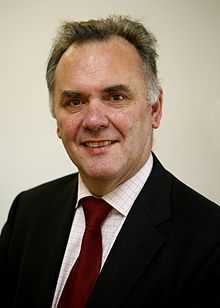Albert Bore
| Sir Albert Bore | |
|---|---|
 Bore in May 2012 | |
| Born |
1946 (age 68–69) Ayrshire, Scotland |
| Occupation |
|
| Organization | Labour Party |
Sir Albert Bore (born 1946 in Ayrshire, Scotland[1]) is a British Labour Party politician and leader of Birmingham City Council. He has served as one of the councillors representing Ladywood ward since 1980. He was a lecturer in physics at Aston University from 1974 to 1999.
Career
Academic career
Bore lectured in nuclear reactor physics at Aston University from 1974-1999[1][2] He holds a PhD in nuclear reactor physics from the University of Birmingham and an honorary doctorate from the University of Aston.
Political career
He is an elected Councillor for the Birmingham Ladywood ward (1980-), Leader of the Labour Group of Birmingham City Council (1999-; succeeding Theresa Stewart), Leader of Birmingham City Council (2012–present and from 1999[2]–2004) and Chair of the Economic Development portfolio. He was the Chair of the University Hospitals Birmingham NHS Foundation Trust(2006-13).[1][2] He is an elected Member of the European Union's Committee of the Regions (CoR; 1992-)[1] and its former President (2002–2004). He is a Director of the Greater Birmingham & Solihull Local Enterprise Partnership.
He stood for Birmingham Selly Oak in the 1987 general election, losing to Conservative incumbent Anthony Beaumont-Dark by 20,721 votes (39.3%) to 23,305 (44.2%).
As Chair of Economic Development and Leader of Birmingham City Council, he was responsible for shaping the major social and economic regeneration of Birmingham during the 1980s and 1990s. This included the negotiation and delivery of one of the first public private partnerships in the UK with the then Conservative government and channelling-in European regional aid funding. This provided infrastructural leverage and partnerships that made him directly involved in the creation of the International Convention Centre (ICC),[2] the National Indoor Arena (NIA), Birmingham's Symphony Hall, the re-development of Brindley Place and refurbishment of The Mailbox and canalsides in the central area of Birmingham, the pedestrianisation of New Street[2] and removal of the "concrete collar" road network in the central Birmingham area and the redevelopment of the Bull Ring,[2] now one of the busiest shopping areas in the UK.
In 1986 Bore formed the Eurocities network[1] between the cities of Birmingham, Barcelona, Frankfurt, Milan, Lyon and Rotterdam.
Bore has been a leading protagonist of devolution and localism agendas in local governance since entering politics in 1974. He has published and lectured widely across Europe and internationally on the subject of city-building, urban renewal, devolution and local governance.
As a member of the EU-Committee of the Regions since its creation in 1992, he has drafted legislative opinions on behalf of local government across Europe on issues including, the European Convention of Human Rights, the Lisbon Treaty, EU-Enlargement, EU-Economic, Social and Territorial Cohesion Policies and the European Union budget.
Business career
Bore is a non-executive director of Birmingham Symphony Hall, Optima Community Housing Association, Marketing Birmingham, National Exhibition Centre Limited, Colmore Business District Ltd and Birmingham Technology Ltd. From 1999-2004 he was a board member of the West Midlands Regional Development Agency.[1]
Personal life
Bore is married with three children.[1]
He was knighted in the 2002 New Year honours for services to local government.[2][3]
References
- ↑ 1.0 1.1 1.2 1.3 1.4 1.5 1.6 Pilkington, Lisa (2012-06-30). "Sir Albert Bore: Back to the future". Estates Gazette. Retrieved 10 October 2012.
- ↑ 2.0 2.1 2.2 2.3 2.4 2.5 2.6 "Sir Albert Bore". Birmingham Post. Retrieved 2010-04-29.
- ↑ "Honours shared across England". BBC. 2001-12-31. Retrieved 2010-04-29.